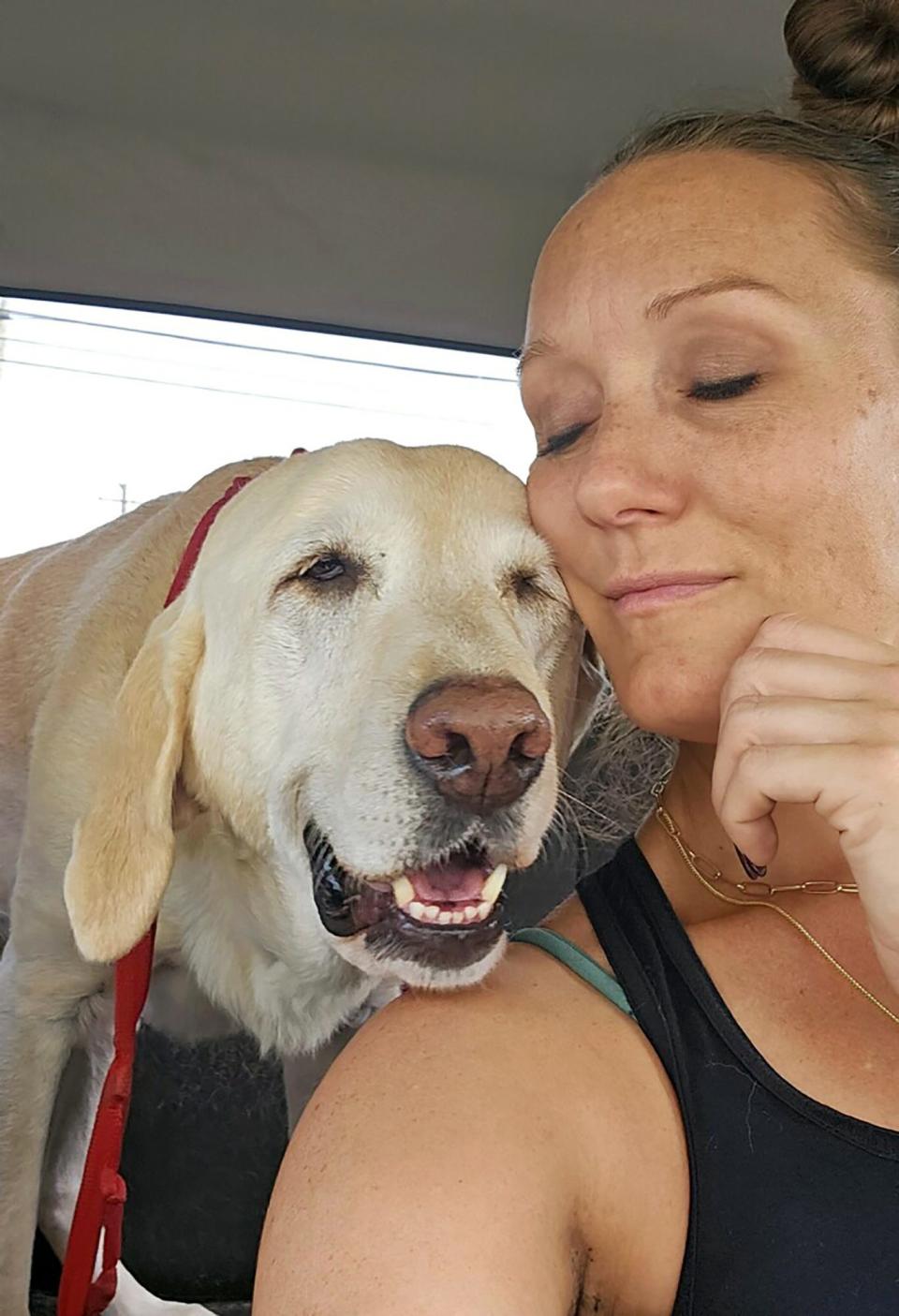'Mystery' dog illness in Michigan? How to keep your pet safe.
Tucker, a 7-year-old American yellow Labrador retriever, is feeling much better these days.
His owner — Amanda House, of Royal Oak — said Tucker had a cough that started in September and lasted for more than a month. What she didn't realize was that Tucker was ill from a mysterious canine virus that had spread to 14 states and resulted in the death of at least one dog.
While state officials have not confirmed the illness nor has Michigan been identified as a hot spot, House and her veterinarian are convinced that's the issue.
House said she assumed it was kennel cough, a common, contagious respiratory illness that makes affected dogs sound like they are honking like a goose and flulike symptoms.
Tucker didn't respond, and House said she knew it was something more serious.
“It was scary,” House said. “Before we knew about what it could be, a prolonged cough typically means it something deeper going on like heart disease or heartworm, so I was worried that something worse was happening.”

The illness was first detected in Oregon after five dogs were sent to the emergency room for pneumonia symptoms and one died. Michigan has not been named as one of those states affected by the disease, but it is not stopping veterinarians and other animal care providers from being on high alert to the illness — that does not respond to antibiotics — and encouraging pet owners on how to keep their animals safe.
Veterinarian Marcy McKeithen said that pet owners should waste no time with this illness if they suspect any symptoms in their pet.
“If your dog is exhibiting any symptoms, call your local vet or emergency clinic” she said.
House said the first time Tucker coughed she kept him away from other dogs and scheduled an appointment with his vet.
“Early detection is my biggest thing with this,” House said. “The second you think you see your dog exhibiting symptoms that seem a little off, talk to your vet. Worst-case scenario, it’s this, best case scenario it’s a little bit of kennel cough.”
In total, Tucker had three vet visits for his illness. On the first visit in September, the dog was treated for kennel cough, but the treatment didn’t work. For the next visit the following month, House said the doctor did bloodwork on Tucker and took an X-ray of his chest.
“The results resembled what looked like a lingering bronchitis,” House said. “So, they put him on a cough suppressant.”
But when November rolled around and Tucker still had the cough, the doctor told House that it was more than likely the “mysterious illness.”
Tucker was then put on a steroid, House said. The vet told her that Tucker was not contagious at this point, and since the steroid treatment, the dog has not coughed.

McKeithen, who is not Tucker’s doctor but has been practicing veterinarian medicine for over 25 years, has serviced animals all over the state of Michigan. She said veterinarians, along with laboratory professionals and vet schools, are still learning about the illness. She said it is unknown whether the illness is bacterial or viral, adding that a vaccine has not been created yet.
“It is not one of our most kind of common pathogens that we see in our kind of pneumonia or upper respiratory cases,” McKeithen said. “It is something different, which is why a lot of our antibiotic therapy has not been helping as much.”
William Bessant, who regularly sees canines at his dog training camps, said this is not the time to let dogs interact with other dogs. He says stopping dogs from going to dog parks, pet day care centers, boarding kennels with group activities and unattended grooming facilities may slow the spread of the illness.
“These places can house the pathogen that is waiting for a host,” Bessant said.
McKeithen — who is the owner of the only Black-owned PetSmart Veterinarian hospital in Michigan, slated to open mid-December at the chain's Troy location — was appointed to sit on Gov. Gretchen Whitmer’s board for Veterinary Medicine beginning in January. Besides preventative measures, she said, the best solution to keeping dogs safe is by getting your pet to a steady baseline of health.
“We can’t control a lot of different things, but what we can control is our pet’s baseline,” McKeithen said. “So that means making sure they are going to the vet at least once or twice a year. Making sure they are on their heartworm and flea and tick preventative. Making sure they are eating a well-balanced diet. Making sure they have been adequately vaccinated against the things that we can vaccinate against. And if you know your pet has underlying respiratory conditions, making sure those are at baseline, too.
“Maintaining those things are going to be our best defense at this point.”
The doctor also encourages pet owners to establish a relationship with a veterinarian now — if you don’t already have one — and to get their pets insured.
McKeithen says that the saddest part about her job is when a pet comes in to be treated for an illness and the cost of care is unaffordable for the pet owner. This often ends in putting the animal down, she said.
Testing for illnesses including the “mysterious illness” can be expensive, she said, and death has also been a result of not just this new illness, but others as well.
“So my thing is, wherever you are right now, stop right now and get your pet insured,” she said. “Because the older they get, the more conditions they are going to have and pet care can be expensive.”
But for those who don’t want to get insurance on their pet, the doctor says to set aside about $20 a week for veterinarian services.
House says she totally agrees with making sure you can afford health care for your pet especially with rare illnesses coming around.
She said Tucker, while he does not have health insurance because his age makes it a little more expensive, regularly saves money for his care every month.
“He is my best friend,” House said. “He is my whole world. It’s just him and I.”
This article originally appeared on Detroit Free Press: 'Mystery' dog illness in Michigan? How to keep your pet safe

